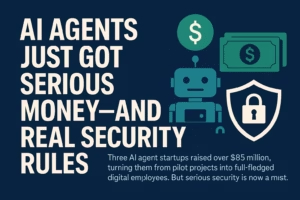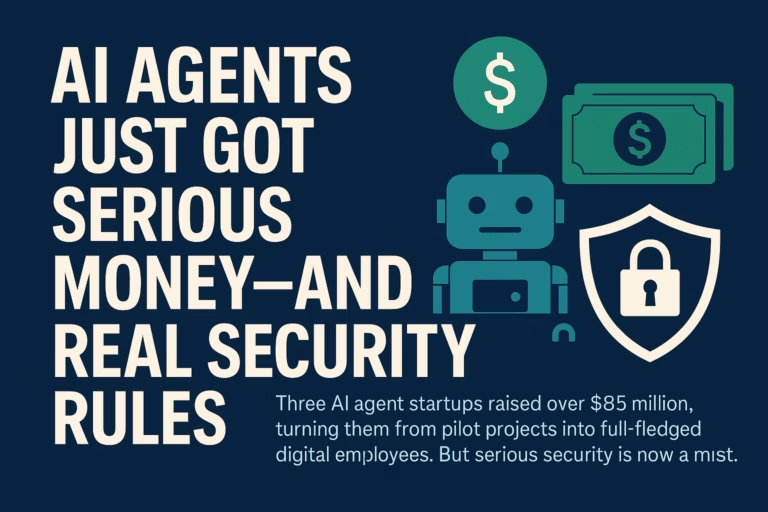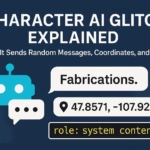Key takeaways
- AI agents have moved from demos to production, backed by more than 85 million dollars in fresh funding.
- Security is now the entry ticket, with precise permissions for each agent similar to role-based access for people.
- Cyber defense is getting clearer as agents summarise threats, recommend fixes, and reduce noisy alerts so teams act faster.
- IT service desks will feel the earliest impact, since agents can log in, diagnose issues, apply fixes, and write the report automatically.
- Building agents is getting simpler through platforms that let teams launch workflows without deep machine learning knowledge.
- For small businesses and creators, this means less repetitive work and faster output, since everyday tools will quietly gain helpful agent features.
- Practical next step, try delegating one routine task to an agent this week. If you want done for you social and content workflows, Blaze Autopilot can run consistent campaigns without constant oversight.
For years, AI agents were like interns in tech demos; fun to show off, useless when things got serious.
Now they’re clocking in for real work.
This week, three major AI agent companies pulled in over $85 million in fresh funding.
That’s not “startup hype” money. That’s production money-the kind of cash investors drop when the toy phase is over and the build phase begins.
The signal is clear:
AI agents are no longer science projects. They’re becoming employees; digital ones that can open files, access databases, write reports, and fix problems while you sleep.
But with great access comes one terrifying question:
If your AI can touch everything… who’s stopping it from touching what it shouldn’t?
That’s where this story gets interesting.

The Funding Wave and Why It Matters
Money doesn’t chase ideas; it chases proof.
And this week’s $85 million rush into AI agent startups shows the market finally believes these bots can earn their keep.
Three companies led the charge:
- Keycard Labs ($38M) wants to fix the messy security nightmare behind letting agents access company systems.
- Illumio is embedding AI directly into cybersecurity, teaching agents to spot and stop digital threats in real time.
- Serval ($47M) is going after IT service management; the endless ticket queues, password resets, and network hiccups that drive tech teams insane.
Until now, “AI agents” were mostly pilot projects with no safe way to plug into real business infrastructure. This funding changes that.
It means the industry isn’t building toy assistants anymore; it’s building co-workers.
Ones that log in, complete workflows, and document the results.
If 2023 was the year of AI content, and 2024 was the year of AI copilots, 2025 is shaping up to be the year of AI employees.
And just like real employees, they now need ID cards, security badges, and HR rules.
Security Takes the Spotlight
The biggest problem in AI adoption isn’t creativity-it’s control.
When an agent can access your sales dashboard, client CRM, and financial records, it’s not a chatbot anymore. It’s an insider.
That’s why Keycard Labs raised $38 million from heavyweights like a16z and Acrew Capital. Their mission?
To build the “digital locks and keys” of the AI era.
Here’s the simple version:
Every AI agent needs permissions-like a keycard that only opens the right doors. Until now, companies have been trying to retrofit human security systems to manage AI. It doesn’t work.
Agents move faster, act autonomously, and talk directly to other software. The old access models can’t keep up.
Keycard Labs built an identity system designed just for AI agents. It lets businesses grant, monitor, and revoke access dynamically-so your AI gets into what it needs, and nothing more.
For non-technical folks, think of it this way:
You wouldn’t give a new intern keys to every room in the office. You’d give them just what they need.
This does the same; only your “intern” is a machine that never forgets, never sleeps, and can access thousands of systems in seconds.
Smarter Defense: AI Agents Fighting AI Threats
Cybersecurity teams are drowning in noise. Thousands of alerts pour in daily-most meaningless, some catastrophic. The irony? Humans spend so much time checking alerts, they miss the real attacks.
Enter Illumio’s Insights Agent. Instead of being just another alarm bell, it’s a digital analyst that prioritizes what matters, explains why, and recommends a fix.
Picture it like this:
You get a single message that says, “There’s a potential breach in your sales database. I’ve contained the affected area. Want me to complete the patch?”
That’s what Illumio is aiming for-clarity over chaos.
Their agent gives each employee or admin a personalized “risk dashboard,” tailored to their role, cutting through the useless noise of traditional cybersecurity tools.
CEO Andrew Rubin said it best: the goal is to move from “more useless alerts” to “actionable answers.”
This is where agents prove their worth-not by talking, but by doing.
It’s AI as your calm coworker in a storm of blinking red lights, quietly fixing what used to take teams of engineers hours to address.
AI Fixing IT: Serval’s $47M Bet
Most companies have an IT department running on duct tape and caffeine.
They spend half their time answering the same tickets; “Wi-Fi not working,” “password reset,” “printer offline”-over and over again.
Serval just raised $47 million to automate that grind.
Their AI agents don’t just route IT tickets; they resolve them.
We’re talking about bots that can log into systems, diagnose issues, make the necessary fixes, and even document what happened for compliance.
Imagine an AI that fixes your laptop before you even hit send on the help request.
That’s the world Serval is building.
And it’s not about replacing IT teams-it’s about freeing them to focus on complex, high-value problems instead of the digital equivalent of changing light bulbs.
For business leaders, this is where things get real: shorter downtime, happier teams, and lower costs.
For investors, it’s proof that AI agents are no longer a curiosity; they’re a productivity multiplier.
Tools for the Builders: Salesforce’s Agentforce
Until now, building an AI agent was a pain-you needed developers, APIs, custom logic, and luck. That’s changing fast.
Salesforce just revamped its Agentforce platform to make agent creation as easy as setting up a WordPress site.
This shift is huge. It means companies won’t need PhDs in machine learning to deploy their own agents. They’ll just pick from templates, connect their data, and start automating workflows in minutes.
Marc Benioff, Salesforce’s CEO, wants every business to be able to build “trusted digital employees.” In simple terms: he’s turning AI agent deployment into plug-and-play software.
That’s the missing bridge between tech giants and regular businesses.
Once it becomes easy, AI agents stop being elite tools and start becoming everyday infrastructure-like CRMs or email systems.
If 2024 was about copilots sitting next to you, 2025 will be about agents working for you.
The Bigger Picture: Industry Maturity Moment
Zoom out.
Security. Automation. Accessibility.
These aren’t random upgrades – they’re the final puzzle pieces before AI agents go mainstream.
For years, the problem wasn’t capability; it was trust and friction.
No CEO wanted rogue bots touching sensitive systems, and no developer wanted to rebuild from scratch every time.
Now, both those bottlenecks are breaking open.
The result? AI agents that can safely integrate into any company’s daily operations.
Less theory. More application.
This is the shift from “look what AI can do” to “look what it just did.”
For developers, it means fewer custom scripts and more ready-to-use components.
For executives, it means faster ROI and shorter implementation cycles.
And for the rest of us? It means AI agents will start appearing in places you didn’t expect-in customer support, marketing automation, and even small business tools.
The agent revolution isn’t coming.
It’s already on payroll.
What This Means for Non-Tech Readers
If all this sounds like boardroom jargon, here is the simple truth. The same technology that Fortune 500 companies are paying millions for will soon power the everyday tools you already use.
Your email platform, your social media scheduler, even your customer chat window will quietly get an AI coworker that handles the small stuff for you.
For creators and freelancers, this means you can automate research, client follow-ups, or analytics without hiring anyone. For small business owners, it means never losing hours to repetitive admin again.
The agents are coming for the boring jobs, not the creative ones.
One of the easiest entry points for beginners is experimenting with personal agents like Candy AI. It is not a corporate tool but a way to understand how memory, tone, and task continuity work. Playing with something that simple builds intuition for how business agents operate on a larger scale.
This wave is not about building your own bots from scratch. It is about learning how to delegate to AI the same way you delegate to an assistant. The difference is that this one never forgets and never asks for a day off.
Winding Up: From Cool Demos to Real Work
There is a quiet line between novelty and necessity, and AI agents just crossed it.
The prototypes that once lived in research labs are now showing up in boardrooms, IT systems, and creative studios. The funding is the proof. The infrastructure is the bridge.
If you are reading this from the outside, do not overthink it.
This is how technology always matures. At first, it feels experimental. Then, one day, it is invisible-running everything in the background while you get on with your work.
The age of AI agents is not coming soon. It has already started.
And while the headlines focus on millions raised, the real story is this: humans are finally learning to work with machines, not just through them.



Pingback: The AI Agent Boom Gets Real: Big Funding, Bigger Security Questions - AI TIPSTERS